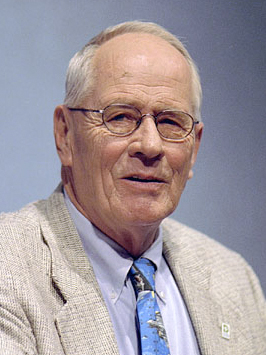
Stephen Edward Ambrose was an American historian, most noted for his biographies of U.S. Presidents Dwight D. Eisenhower and Richard Nixon. He was a longtime professor of history at the University of New Orleans and the author of many bestselling volumes of American popular history.

The association of Nazism with occultism occurs in a wide range of theories, speculation, and research into the origins of Nazism and into Nazism's possible relationship with various occult traditions.
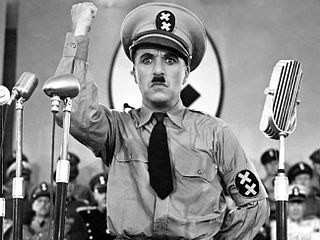
Adolf Hitler, dictator of Germany from 1933 to 1945, has been represented in popular culture ever since he became a well-known politician in Germany. His distinctive image was often parodied by his opponents. Parodies became much more prominent outside Germany during his period in power. Since the end of World War II representations of Hitler, both serious and satirical, have continued to be prominent in popular culture, sometimes generating significant controversy. In many periodicals, books, and movies, Hitler and Nazism fulfill the role of archetypal evil. This treatment is not confined to fiction but is widespread amongst nonfiction writers who have discussed him in this vein. Hitler has retained a fascination from other perspectives; among many comparable examples is an exhibition at the German Historical Museum which was widely attended.

Max is a 2002 drama film, that depicts a fictional friendship between a Jewish art dealer, Max Rothman, and a young Austrian painter, Adolf Hitler. The film explores Hitler's views which began to take shape as the Nazi ideology; while also studying the artistic and design implications of the Third Reich and how their visual appeal helped hypnotize the German people. The film goes on to study the question of what could have been had Hitler been accepted as an artist. The film was the directorial debut of Menno Meyjes, who also wrote the film.

Sir Richard John Evans is a British historian of 19th- and 20th-century Europe with a focus on Germany. He is the author of eighteen books, including his three-volume The Third Reich Trilogy (2003–2008). Evans was Regius Professor of History at the University of Cambridge from 2008 until his retirement in 2014, and President of Cambridge's Wolfson College from 2010 to 2017. He has been Provost of Gresham College in London since 2014. Evans was appointed Knight Bachelor for services to scholarship in the 2012 Birthday Honours.

The Meaning of Hitler is a 1978 book by the journalist and writer Raimund Pretzel, who published all his books under the pseudonym Sebastian Haffner. Journalist and military historian Sir Max Hastings called it 'among the best' studies of Hitler; Edward Crankshaw called it a 'quite dazzlingly brilliant analysis'.

Adolf Hitler was an Austrian-born German politician who was the dictator of Nazi Germany from 1933 until his suicide in 1945. He rose to power as the leader of the Nazi Party, becoming the chancellor in 1933 and then taking the title of Führer und Reichskanzler in 1934. During his dictatorship, he initiated the European theatre of World War II by invading Poland on 1 September 1939. He was closely involved in military operations throughout the war and was central to the perpetration of the Holocaust: the genocide of about six million Jews and millions of other victims.
The historiography of World War II is the study of how historians portray the causes, conduct, and outcomes of World War II.
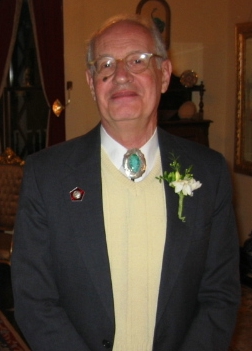
Gerhard Ludwig Weinberg is a German-born American diplomatic and military historian noted for his studies in the history of Nazi Germany and World War II. Weinberg is the William Rand Kenan, Jr. Professor Emeritus of History at the University of North Carolina at Chapel Hill. He has been a member of the history faculty at UNC-Chapel Hill since 1974. Previously he served on the faculties of the University of Michigan (1959–1974) and the University of Kentucky (1957–1959).
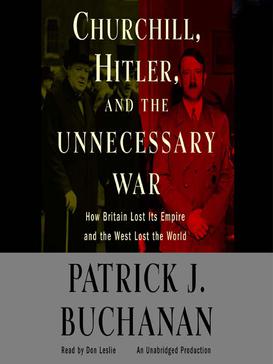
Churchill, Hitler and the Unnecessary War: How Britain Lost Its Empire and the West Lost the World is a book by Patrick J. Buchanan, published in May 2008. Buchanan argues that both world wars were unnecessary and that the British Empire’s decision to join the wars had a cataclysmic effect globally. One of Buchanan's expressed purposes is to undermine what he described as a "Churchill cult" in America's elite. Buchanan focuses particularly on how Winston Churchill helped influence Britain into the world wars with Germany in 1914 and in 1939.
The foreign policy and war aims of the Nazis have been the subject of debate among historians. The Nazis governed Germany between 1933 and 1945. There has been disagreement over whether Adolf Hitler aimed solely at European expansion and domination, or whether he planned for a long-term global empire.

The Wehrmacht were the unified armed forces of Nazi Germany from 1935 to 1945. It consisted of the Heer (army), the Kriegsmarine (navy) and the Luftwaffe. The designation "Wehrmacht" replaced the previously used term Reichswehr and was the manifestation of the Nazi regime's efforts to rearm Germany to a greater extent than the Treaty of Versailles permitted.
Frank McDonough is a British historian of the Third Reich and international history.

World War II Behind Closed Doors: Stalin, the Nazis and the West is a 2008 six-episode BBC/PBS documentary series on the role of Joseph Stalin and German-Soviet relations before, during, and after World War II, created by Laurence Rees and Andrew Williams.
The Hitler Gang is a 1944 American pseudo-documentary film directed by John Farrow, which traces the political rise of Adolf Hitler. Described as a "documentary-propaganda" film by its studio, Paramount Pictures, the historical drama is based on documented fact and marks the first serious effort to portray Hitler in film. The filmmakers chose to avoid casting stars in the lead roles, assembling instead a remarkable company of lookalikes to play Hitler, Goebbels, Himmler, Göring, and other leading Nazis.

Human Smoke: The Beginnings of World War II, the End of Civilization is a 2008 book by Nicholson Baker about World War II. It questions the commonly held belief that the Allies wanted to avoid the war at all costs but were forced into action by Adolf Hitler's aggression. It consists largely of official government transcripts, newspaper articles, and other documents from the time, with Baker only occasionally interjecting commentary. Baker cites documents that suggest that the leaders of the United States and the United Kingdom were provoking Germany and Japan into war and had ulterior motives for participating. He dedicates the book to American and British pacifists of the time who, he states in the book's epilogue, were right all along: "They failed, but they were right."

The generally tolerant official drug policy in the Third Reich, the period of Nazi control of Germany from the 1933 Machtergreifung to Germany's 1945 defeat in World War II, was inherited from the Weimar government which was installed in 1919 following the dissolution of the German monarchy at the end of World War I.
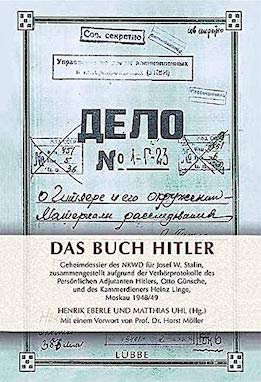
The Hitler Book: The Secret Dossier Prepared for Stalin is the 2005 publication of a long-secret Soviet report on the life of Adolf Hitler written at the behest of Joseph Stalin. It was edited and translated into German by Matthias Uhl and Henrik Eberle.

James Holland is an English historian, author and broadcaster, who specialises in the history of the Second World War.















